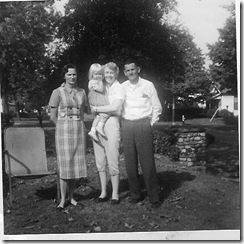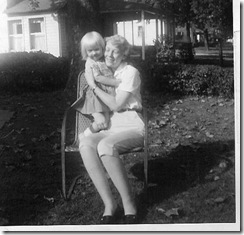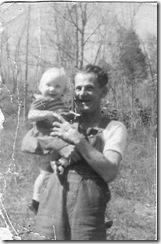I have never felt like I fit into my environment in most places I have lived. I often have felt as if I'm out of place either by my coloring (genetic makeup,) my views/opinions, my religious outlook, my interests, my clothing, or other factors. I think people like me and respect me—I just don’t always feel as if I belong somehow. Out of place.
The summer before I entered sixth grade, my family moved from the city to a rural home set on an acre of God’s Green Earth in Indiana. I was so excited to be in the country, and loved it from the first time I saw it. The little Indiana-mined-limestone house sat on a small tract of land between a creek (a ditch, actually, but it had every form of natural creek creatures you could find,) a rural road, a state road and surrounded by the crop of the summer (whatever Comers decided to plant that year—corn or soybeans.) I felt I was truly “home.” In the city I had spent five years in a denominational Christian school—2 rooms housing 8 grades, and I can tell you dozens of reasons I didn’t fit in there. But that means going back to that time.
Across the road from us in our new domicile was a country church and a brick house with four kids—two older ones, one girl was my age, and the youngest boy at the time was my only sibling brother’s age (they ended up having one more boy a few years later—the mom didn’t jump off the bridge, like she felt like doing, as she had one son in college when this happened.) Their dad was funny, had a few missing teeth, was a brick mason, and kept a meticulously groomed yard. He whistled while he worked. Not just any whistling, but mostly school fight songs and “Charge!” He was a huge Argyll fan (our school mascot was a Scottish warrior and we were called the Argylls. Yes. In Indiana. In the middle of a cornfield. It can happen. ) He built a tree house, a baseball diamond and a chicken-wire backstop in the church yard next door and gave us all the boards we could carry to build rafts and bridges on the crick. (Remember, we call it a “crick,” not a creek.)
There were other houses around with friendly, but reserved-we’ll-mind-our-own-business Quaker-rooted people. Good, solid people, for the most part. Huge work ethic, like us. Just up the road, within half-a-mile, was my new public school with the prophetic name of Liberty. I didn’t fit in the first day. I was wearing the wrong kind of socks.
Now, you would think these kinds of fashion faux pas were nonexistent amongst a handful of 11-12-year-old country girls, but I was immediately pulled aside by a very outgoing and popular girl named Lorrie (who later was my best friend and we were in each other's weddings) and told, “We don’t wear white bobby socks here. Get yourself some knee socks.” Man, did I ever feel like I’d dropped into a Dr. Seuss book without a star on my belly.
So, I went home, cried a lot (I was, after all, an 11-year-old girl) and my mom loaded me up for the long trek to the city to buy a pack of knee socks. It was an easy fix. That simple pair of knee socks let me blend in enough to not be "too weird." I was kind and friendly to everyone in the class and I changed my name. “Call me Chris,” I told my teacher, Mr. Rosen.
I always hated my real name--I didn't know any other Crystals, just Lindas, Marys and Debbies,Lorries, Melodys and Carolyns. My family called me Cris or Crissy. The new neighbor boy, who treated me like one of his sisters, called me “Cristy!!!” said this hissed out between clenched teeth about 10 times a day.) I did not want to be called “Crystal,” like at my old school, but going by the spelling C-R-I-S like my family used, seemed too intimate. Plus, I thought
Chris sounded and looked “cool.” I easily adjusted into my name. I became
Chris Warren.
I could play with anyone I chose to at recess, and even though we girls had to wear dresses, I knew I fit in on a baseball diamond. I lived and breathed baseball everyday. When they saw I could hit, they let me play whenever I wanted. Maybe it was the way I was brought up, but I was never afraid of anyone, so I went up to the boys and said, "Can I play?" and since no one verbally objected, probably because their mamas taught them manners, I took my place in the line up. With a dress. Back then girls were required to wear dresses.
The girls stood around in groups. My teacher referred to these groups as cliques. The boys, even boys from other grades, could play together, but not the girls. I never asked if I could stand there with the girls. You don't ask girls this or you are dead. I at least knew this much. I let them get used to me, but I also let them know I was one of them. (I had the knee socks now.)
So, I had my knee socks, I was playing baseball whenever I wanted to, and I talked to a different group of girls each recess. Plus, when I’d go home, I had a crick to catch crawdads, swing a rope over or build a bridge over, and a real baseball diamond to play on. Over the state road on the fly was a home run. Over the road on a roll was a ground-rule double. For the first time in my life I felt like I was “home,” even if I didn’t quite fit any one group at school.
Most of the girls in my class had lived in this area their whole lives. In fact some of their families went back for several generations. Some of those girls still live here and are now raising their children and grandchildren here. (My now family returned to this area after being away for something like 15 years or so.)While immigration brought people to the “new world,” Indiana was the “new West” at one point in history. Some people to this day think that Indiana is the end of the world. (They are the ones who are town historians and "belong" here.)You can take that anyway you like. People continue coming to this area to visit from all over the world, but only because they think that Jimmy Dean’s ghost walks around here. (Or maybe little James Dean clones. But then, that would make this blog science fiction. )
But what made our 6th grade class distinctive was that here we were in the bread basket of rural Indiana, and we blessed our bread with mostly Quaker prayers, a Baptist prayer or maybe the open-minded United Methodist prayers (only to be chastised by the Wesleyans’ prayers,) and our teacher was part Jewish with an artist sister who lived in New York. He was different.
I can’t remember anyone really mentioning this bit of background, except maybe like describing where something was located to someone from out of town. "Yup, yup, you go to the corner of First and Sycamore, and turn left at that Jewish teacher's house." It's not meant to be a judgment or a criticism. It's just some way to distinguish each person and that alone made him "different." Otherwise, we all looked the same. No one was staring or gawking or whispering about his worldview. And he really did bring a different perspective to our lives. We all liked him. He was tall. (Don't miss this--we were very basketball crazy back in those days in Indiana.) He had curly, kind of springy black hair, and now that I remember him I could easily see him blending in on the streets of Israel.
I don’t recall exactly the moment when I realized he was Jewish. I knew he smoked like a chimney because while our little rural school only had about 9 or 10 (small) rooms, the teacher’s lounge was always filled with blue smoke and he definitely was the culprit. It was a very small school. We knew everything about everyone, or so we thought.
What really made him stand out was that besides Mr. Milton James, the janitor, who I think was a farmer, he was the only male in the building most of the time. And he didn’t quite fit the profile of even the teachers. Our principal was a petite, older woman of an obvious ultra-conservative Christian religious persuasion and whose mean streak included showing kindergarteners her iodine-soaked-to-look-like-blood paddle. Kept us all in line, and she was the reason girls had to wear dresses, even though culottes, which looked like skirts, had hit our Cornfield Corner fashion page. But yet, he fit in perfectly.
And maybe because of this, I knew someday I would fit in out here in the sticks, somehow, some way. He knew all about me and apparently didn’t blink an eyeball about it. He didn’t teach us conventional stuff, either. He had this passion for Edgar Allen Poe and would turn off the lights and read a little Edgar every day. That was my favorite thing. Beating hearts behind walls. Eueew, scary. He made us write, and oh, he also had an art contest one time.
His sister was an artist and was visiting him from New York, so he had this art contest and he had her judge them that evening at home. First prize went to my (now) good friend Linda Leckron. She was a straight-A student, who later was a cheerleader and graduated 2nd in our class. She always did everything perfect (that’s why she picked me to be her roommate in college and why we were in each other’s weddings.) Who could beat someone like that? And frankly, you liked her so much, you were glad she won everything.
I can even remember that her picture was of a clown. It was very good. It later would remind me of the clowns Red Skelton used to paint. (He was another Hoosier.) Anyway, I cannot for the life of me remember who got 2nd place or what the picture was, but, I got 3rd place.
Now, you’d think everything would be hunky-dory, but for some reason, though I was quiet and never uttered much of anything, so I didn’t complain, Mr. Rosen felt like explaining to me how I got 3rd place. Here his sister was some artist and apparently quite good, according to her brother, but he and she (as siblings are wont to do) argued strongly over my picture and whether it should have a prize at all. It seems she thought I should get first place (yay! An artist thought I was good) and he thought anyone could go out and take a photograph of my picture, so it wasn’t really art. I think he meant that he thought I should have last place, even though there wasn't such a place. At least this is how my 11-year-old-I'm-new-here mind took this info.
Well, at this point in his explanation, I sort of felt like an artist and wanted to slit my wrists. I didn't know his artist sister, would never see her, and all I cared about was whether I was going to get a "F" in art. But he gave into his sister a little bit and gave me a prize--third place. Only three places were given prizes.
I am not sure why he wanted to explain all this to my 11-year-old precarious ego new to a school and way of life. I just wanted to blend in and I could have lived the rest of my life without knowing that my picture had caused this major argument between adult siblings—one of them my teacher. Or that said teacher hated my picture and thought anyone could do what I had done. I think I got a box of cough drops, so what was the big deal? Linda got this big chocolate something—maybe one of those Russell Stover boxes. We all envied her with our stomachs. Cough drops, however, were legal to eat in class and you didn't have to share. All you had to do was "cough' a little and it was then acceptable.
I took my picture home after it had been displayed appropriately as a prize winner, but I did not enjoy my status. I was thinking I never wanted to express my own personality again. Who wanted to be in a stupid art contest, anyway? I would’ve been perfectly happy to have just been one of the “losers” and gone happily and obliviously(I love adverbs) along, blending in.
But my picture, as my life seems to always do, caused controversy among my classmates, who looked at my picture with new eyes--"is that really art??"--like a sixth grader cares, and more importantly, between adults. And everyone in the class knew it.
We were surrounded by cornfields, and though John F. Kennedy had one time driven by our school on the state highway while campaigning to be president (I heard about it,everyone went out and waved,) no one would notice us even being on the map. I wasn't going to be the next Hoosier Picasso. And who cared if my picture could be taken by a camera? I made the whole thing up in my mind. I had never seen this place before. It was a mere longing in my heart and it didn't look like Indiana. Ol' Edgar could've showed up at that point, bricked me up behind a wall, and I would've yelled, "Thanks, Ed!"
I didn't eat those cough drops. I let them melt in my bottom drawer.
"Chris Warren" in the limestone house with her knee socks.



















